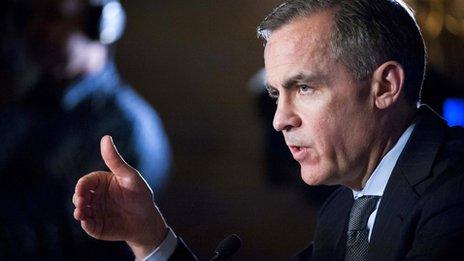Forward guidance: dead and alive
- Published
- comments

Bank of England governor Mark Carney
On Wednesday, the Bank of England will not, I think, announce any simple new numerical target for unemployment or any other statistic that it would categorise as a threshold for raising interest rates.
I am almost 100% sure about this - although please don't shoot me if I am wrong.
If I am right, why does it matter?
Well, you will remember that last August there was a mini revolution at the Bank of England.
Before then, the convention of the Bank's Monetary Policy Committee and its governors was never to formally comment on how long the interest rate they control, Bank Rate, would remain at a particular level.
There was the odd elliptical hint - through the publication of forecasts, for example, showing inflation would be above target if market expectations of interest rates were correct. But this was all coded stuff, hardly clear and transparent guidance to households and businesses.
When the previous governor, Lord King, was asked what was likely to happen to interest rates, he came over all trappist.
So it was quite an innovation last summer when the Bank of England said that there was no possibility of interest rates rising until the unemployment rate fell to 7%.
This was seen as a steer that interest rates would remain at their record low levels for at least three years - which was the Bank's then expectation of how long it would take for the unemployment rate to reach 7%.
But here we are, six months later, and the unemployment rate is already a whisker over 7%.
Not quite dead
So for the purists, if forward guidance is not to be buried on Wednesday, Governor Carney has to announce a new unemployment or other target that has to be breached before interest rates rise.
And as I understand it, that ain't going to happen.
Surely, therefore, forward guidance is as dead as Monty Python's parrot.
Well perhaps not quite.
Mr Carney and his MPC colleagues will not return to Mervyn King's policy of institutionalised, formal silence on the direction of interest rates.
I expect him to say on Wednesday that he expects interest rates to remain at their current low levels for some considerable time. And to repeat that as and when they do rise, they will not return to the levels we took for granted as normal in the boom years.
He will continue to signal his conviction that the price of money will remain historically cheap for years to come, because the massive indebtedness of the UK means any recovery would be snuffed out by interest rates that only six years ago we would have regarded as unexceptional.
So if forward guidance were to mean giving more of an explicit steer about what businesses and households can expect to pay to borrow over the coming months and years, then Mr Carney and his colleagues will stick with forward guidance.
Soft guidance
And I am sure that Mr Carney will also give a lot more information about the data, indicators and forecasts used by the MPC when setting interest rates. In that sense, we should all be in a better position to second guess their decisions.
All that said, this form of soft forward guidance is certainly not the bold hard revolution of last summer's announcement of a single statistical threshold for a rate change.
Also right now, soft guidance is very easy to make consistent with the MPC's fundamental mandate and traditions - in the sense that, for the first time in years, inflation is at target and falling.
So, even without Mr Carney telling us what to expect of interest rates, a one-eyed monkey could look at the Bank of England's new forecast for inflation and confidently predict that interest rates will remain low for some time.